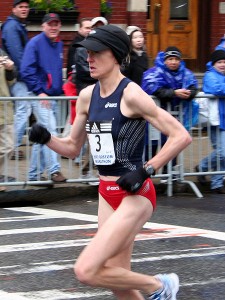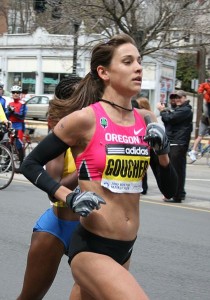What About This Resurgence in American Women’s Marathon Running We Keep Hearing About?
By Lloyd Levine, Special to the SRN
Quick! Name the second fastest (ever) female U.S. Marathon runner. The answer will probably surprise you.
Recently, I wrote about Ryan Hall and the state of men’s marathon running in the United States. Given that, it seems only fair to look at the status of women’s marathon running in the U.S. as well. The women don’t have a Ryan Hall type figure (i.e. fast times but no wins) who draws praise, and scorn in equal measures, but the status of women’s marathon running in the U.S. is not much different from that of the men. There are a few women marathon runners who draw praise and generate excitement but, except for Deena Kastor, have little to show in the way of meaningful results or times. Additionally, like the men, there is really very little depth in the talent pool.
Most serious marathon runners in the United States probably know that Deena Kastor holds the American Record, but do you know who the second and third fastest are? After analyzing the 1,875 (which is how many times the 2:30 mark has been broken) fastest women’s marathon times of all time it appears that the United States has only had two, legitimate, top-level marathon runners, Deena Kastor and Joan Benoit–who is still the second fastest U.S. woman of all time, despite having run her best time 1985. (Editor’s Note: The list, updated today, now includes 1,917 names but the analysis of the standing of the US women has not changed materially.)
Deena Kastor and Joan Benoit are the only U.S. women to have won major marathons, posted times competitive with the best in the world, and won Olympic medals. Deena Kastor has a PR of 2:19:36, good for 11th place on the all time list (and fifth on the all time list of women not named Paula Radcliffe). Deena won the bronze medal in the Athens Olympics, and has won London and Chicago (as well as many other top finishes). Joan Benoit has a PR of 2:21:21, won the Olympic Gold medal, held the world record, and won numerous marathons.
Benoit has long since retired from competitive running. At this point in Kastor’s career, given that she is now 38 and is still working her way back into shape after giving birth to her first child, it remains to be seen if she is still the top U.S. woman and if her times and results will be competitive on the world stage. And if so, for how long. Realistically, it seems a bit much to expect that she will be competitive for much longer after the 2012 Olympics (assuming she makes the team). Beyond Kastor and Benoit, there is a huge drop off to the “next generation”.
The third fastest U.S. woman ever is Desiree Davila, but that time was run at the wind-aided Boston in 2011 (None of the times from the 2011 Boston were used in the analysis of the men’s side.). Davila’s next fastest time? 2:26:20, good for 539th on the all time list. And, while Boston was thrilling and her second place finish stirring, her time was still only good enough for third on the all time U.S. list. Further, Davila has run six marathons, and only three of those were faster than 2:30. But she is only 29 years old so it remains to be seen whether her 2011 performance at Boston was an aberration or a continuing trend. Regardless, she will need to improve on her time if she wants to be competitive with the Kenyans and Ethiopians
After Davila’s wind-aided Boston time, the next highest placed runner on the list is Kara Goucher. Kara’s best time is 2:24:52, good for 268th fastest of all time, but that too was run at Boston in 2011. After that her next fastest time is 2:25:53 in New York, good for 437th all time.
Again, discounting Davila’s 2011 Boston performance, Goucher is the only U.S. runner, other than Kastor and Benoit, who ranks in the top 500. Goucher has only run four marathons as she has split her time between the marathon and the track (where she won a bronze medal in the 2007 World Championships), and has generated significant excitement with two third places finishes in Boston and New York, as well as a fifth place in Boston this year. Kara is definitely an exciting runner and clearly shows potential, but based on her times alone she has a long way to go to catch up to the rest of the world.
Another contemporary runner is Shalane Flanagan. Again, she does not engender the same feverish, polarized feelings that Ryan Hall inspires, but she is often mentioned as a real hope for American women in the marathon. Most of this hope appears to be based on her track career, specifically her bronze medal at 10,000 meters in the Beijing Olympics. She went on to finish second in the 2010 New York City marathon, but her time was 2:28:40, which places her in a tie for 1,273 on the all time list. To date that is her only marathon.
Flanagan’s second place is good, and places in major marathons are important, but to really be world class means being able to run the times necessary to win a marathon on a day when the pace isn’t pedestrian. If the winning time in 2010 were 2:22:something, would Flanagan have been there in the end? No one knows, but it is an important question as the winning times for most major marathons are well under 2:25.
And beyond Davila, Goucher and Flanagan? (And remember Davila’s time was at Boston in 2011.) The next fastest U.S. woman is Magdalena Lewy Boulet with a 2:26:22 in Rotterdam last year. However, in looking at the men’s times a distinction was drawn between U.S. born and non-U.S. born. Magda was born in Poland, which doesn’t necessarily carry the same connotations as being from Kenya or Ethiopia, but she is foreign born nonetheless. Additionally, Magda will turn 39 in January so its very hard to call her the future of U.S. running either.
Next on the list? Julie Brown who ran 2:26:26…in 1983. Followed by Kim Jones at 2:26:40…in 1991. Most of the top times have been run by women who are no longer competing, or are in their late thirties. Of the 1,875 fastest women’s marathon times, only 60 belong to women from the United States. And 15 of those were run by Kastor and Benoit. Of all the U.S. women who have run under 2:30 for the marathon, only 3 are under the age of 30. And except for Goucher’s 2:25:53 in New York (and discounting Goucher and Davila’s 2011 Boston), none of those women have run under 2:26:00.
In any given marathon, it really comes down to one U.S. runner against the world. In the 2011 Boston marathon, of the top 15 runners, there were five Kenyans and four Ethiopians. Yes, the U.S. placed 2nd and 5th, but what about London, Chicago, Berlin, Rotterdam, Amsterdam, and the World Championships? (I omitted New York because of its close proximity to the U.S. Olympic Trials. Except for Meb, there were no elite U.S. runners of either gender in New York this year.) In all those races, going 15 places deep in each race, there were only five American women who placed in the top 15. That is five out of a possible 90 places. And frankly, it was only a lack of depth that allowed the U.S. women to place as high as they did in those races. Of the women who placed in the top 15, the fastest time was 2:36:58, which was good enough for 10th place in Chicago (for perspective, Boulet ran 2:31:22 in London, but finished 23rd). Going outside of the major, large, fast marathons, the fastest time by a U.S. woman in 2011 was Amy Hastings 2:27:03 in the Los Angeles Marathon, followed by Stephanie Rothstein’s 2:29:35 in January at Houston.
So what it boils down to is this: if Goucher, Kastor, and Flanagan (and perhaps Davila) are not in the race, there is no American who is remotely likely to contend for a major title.
Again, this is not to pick on the U.S. women, any more than the original article was intended to pick on the men. My intent is simply to point out that the talk of a resurgence in U.S. women’s marathon running is overblown. Clearly, at least with Goucher, Flanagan, and Davila, there is potential. But we will need to see more results and faster times to really believe they can consistently compete with the East Africans (and the Eastern Europeans who we didn’t discuss here). And even if they, or one of them, produces those times and becomes competitive, the U.S. still falls well short of the East African depth.
Lloyd Levine is the President of Filament Strategies, a strategic consulting firm. He is a former California Assemblyman, where he represented the San Fernando Valley. He is also a runner.




Lloyd,
1Good assessment on US marathoning. For the sake of interest, how about the same assessment on other countries. Start with Kenya and Ethiopia, then Great Britain, Germany, Brazil, etc. Just to see how critical we may be on our athletes.